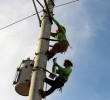He believes that the best solution for Mindanao’s power woes is to install an “effective mix” of renewable energy plants mainly hydropower and solar.
By DANILDA L. FUSILERO
Davao Today
KIDAPAWAN CITY, Cotabato, Philippines — Amidst the continuing six to eight hours of daily rotational brown-outs in this city and other parts of the Mindanao, Makabayan senatorial candidate Teddy Casiño urged the government to fast-track the rehabilitation of the Agus-Pulangi Hydro Power complex and to invest more on sustainable and renewable sources of energy.
Casiño pointed this out as he believes that the best solution for Mindanao’s power woes is to install an “effective mix” of renewable energy plants mainly hydropower and solar.
Since last year, the lawmaker has been pushing for the massive deployment of solar energy systems through his One Million Solar Roofs Act which provides incentives and financing facilities to electricity consumers who want to put up their own solar panels.
Given the abundance of solar energy in the country and the modular nature of the solar energy systems, Casiño said that solar energy can be an immediate and sustainable way to solve Mindanao’s power woes.
“Solar power has the ability to shave the daytime peak demand for major cities in Mindanao,” he said citing Davao, Cagayan de Oro, General Santos, Cotabato, Iligan and Zamboanga.
He said that if only the government harnesses the country’s solar resources, the country can build additional supply of power; liberate the people from expensive, dirty and imported fossil fuels; and develop the local renewable energy industry.
The renewable energy, he also believes, may be the “cheaper” investment in the long run, citing the Feed in Tariff (FIT) rates approved by the Energy Regulatory Commission (ERC) last year, which he said is already almost at par with the traditional energy sources.
The ERC has set the following FIT: PHP 9.68 per Kilo-Watt hour for solar, PHP 8.53 per KWh for wind, PHP 6.65 per KWh for biomass and PHP 5.90 per KWh for hydropower.
Meanwhile, Casiño challenged the government to lay down workable measures from the context of sustainability and public interest to arrest the power crisis especially that it already gravely affected households, micro industries and small business sectors.
He said that the government must “stop the privatization of the power industry,” noting that electricity is a strategic public service industry that “should not be mistaken as a profit-making venture.”
He also criticized the solution of diesel-fed bunker and modular generator sets as “short-term and profit-centered for a few energy corporations.” He instead reiterated his proposal for the government take-over of private power barges in Mindanao to provide at least 120 MW of power at much lower rates.
Earlier this week, the Kidapawan City-Local Council of Women, an aggrupation of 34 women organizations, also opposed the government solution calling it “palliative and an added burden for the consumers.”
The group has instead pushed Kidapawan City’s claim on the 25 percent preferential load dispatch from the 104MW Mt. Apo geothermal plants, citing section 6 of the DoE Act of 1992 which states that as host of a power generating facility, the city should be afforded the said load dispatch in times of power crisis.
The group also signified their call to scrap the Epira Law.
In a manifesto sent to the Department of Energy and other government agencies, they said that the Epira Law “failed to protect public interest affected by the continuing power rates increases, appalling services and privatization schemes prejudicial to public consumers.” (Danilda L. Fusilero/davaotoday.com)










